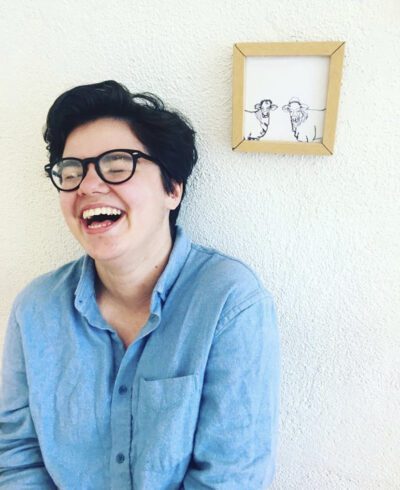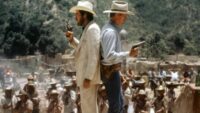A Love Song is a quiet, subdued, force of nature. There are few things as romantic as the American West, and the candy-colored wide open skies, the ever-looming mountains, and sparkling lake make for a spectacular setting for this story of regret and longing.
For the first eight minutes and twenty seconds, the film’s main character, Faye (Dale Dickey), is completely silent. The camera watches as she makes coffee, fishes, and busies herself at her isolated campsite. It’s only when a group of young people knock on her caravan door to ask if she’ll trade campsites that Faye finally speaks. She’s waiting for someone, she says, and they know to find her there.
The person Faye’s waiting for is Lito (Wes Studi), a childhood friend she hasn’t seen in more years than she can remember. Faye doesn’t know the exact day he’s coming, or even if he’ll come at all, but she exists solely on coffee, crawfish, and hope as she waits. When he finally arrives, old feelings return to the surface.

Dickey and Studi have built careers as supporting characters, but A Love Song is their opportunity to shine. Finally, center stage is theirs and they command it fully. When the two meet after decades apart, the screen is filled with a tension that audience members can feel in their bones. Faye and Lito know nothing of each other’s lives after childhood, but they’ve both decided to come to this campsite in the middle of nowhere, and that means something. Their first words to each other are a greeting of “howdy.” So much is said in that one word through the subtextual, nuanced performances of Dickey and Studi. “Howdy” is more than a hello, it’s a childhood friendship returned, a flame reignited, and a prayer answered.
This campsite is on the lake where Faye and Lito used to go on high school field trips. They reminisce sitting on these rocks, their feet dangling in the water as they did when they were sixteen. Only now, they’re in their sixties and they’re widowed. Something about being with each other in a place they frequented in their youth makes them feel young again. They’re giggly, goofing off, and sharing ice cream like a couple of teenagers.

In many ways, A Love Song feels like the younger sibling of the Before Trilogy. They’re all films centered on two people with a romantic past, but there’s much more restraint in A Love Song. Perhaps that speaks to the age differences of the characters. The Before Trilogy spans roughly thirty years, but Celine (Julie Delpy) and Jesse (Ethan Hawke) are still younger than Faye and Lito. It’s not that Faye and Lito inherently have more wisdom or intelligence because of their ages, but they’re more aware of what’s at stake. They realize how inconceivable it is that life has brought them together again. That they can love their deceased partners and still have an open heart to experience romance again. And that they want to start something new, especially something as exhausting, frustrating, and worthwhile as a partnership.
Some may find the film slow, as is always the case with restrained relationship studies. The characters end up in the same place, physically at least, where they started. Yet each scene is layered with so much subtext that Faye and Lito are almost entirely different by the end of the story. Every conversation they have operates on two levels. The first is reality, the basic, boring conversations. Underneath that are the real questions and feelings. Faye and Lito’s conversation about a field trip and how they almost kissed is not playful reminiscence. It’s testing the water to see where the other stands. An entire second script had to have been written detailing what wasn’t being said, but needed to come through.
“Do you reckon you can love something if it ain’t there no more?” Faye asks Lito. He responds with, “I know you can. Don’t you?” A Love Song is a melancholic, bittersweet ode to love. The love of families, of partners, of friends. On the mountains, in the sky, on the lake. In the past, present, and future, or all at once. All of love’s many forms and manifestations have purpose, no matter how fleeting or enduring they are. Love can mean always having a pot of coffee ready for the mailman, burying a loved one so they have a nice view, or the open road of possibilities.



